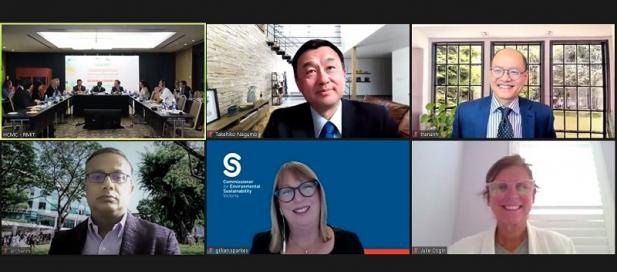Commissioner for Environmental Sustainability Dr Gillian Sparkes delivered a keynote ‘What Makes a City Sustainable? Science, Technology and Sustainable Development’ at the inaugural virtual Smart Cities Forum on 22 January 2021.
Co-organised by RMIT University and the Ho Chi Minh City People’s Committee, the Smart Cities Forum brought international and industry experts together from Australia, Singapore, Japan, the United States and Vietnam to discuss the building blocks of smart and sustainable cities.
Dr Sparkes discussed the pioneering work of the Victorian Commissioner for Environmental Sustainability and her role preparing independent and objective scientific reporting on Victoria’s environment. She explained one of the key objectives of her role as Commissioner “is to encourage decision making that facilitates ecologically sustainable development”.
In her presentation, Dr Sparkes highlighted the importance of cutting-edge science in every stage of delivering more sustainable cities. Identifying the importance of monitoring and prediction and evoking the work of UNSW Professor Andy Pitman, Dr Sparkes highlighted the importance of investment in “serious computing, data science, outstanding technical people and outstanding scientists” as essential for creating smart, sustainable cities. “Investment by governments in these capabilities and workforce skills is critical. It is about knowing what we need to know, when we need to know it,” she said.

Dr Sparkes showcased concepts from her Science for Sustainable Development Framework including the UN SDGs as a coordinating framework to enable policy coherence and the importance of spatially resolved data for informing cities and urban planning. “Space, spatial and digital technologies offer a new level of understanding and sensemaking aligned to the common purpose of sustainable development and building resilient communities. Spatial technologies can provide more data, more often about more things at scale,” she said. “Digital technologies – including earth observation, spatially resolved data and photography coupled with machine learning, for example, to automate algorithms and interrogate the spatial data are game changers.”
Dr Sparkes explained how this data is rapidly becoming more affordable and more accessible – data about people, the built environment and the natural environment. “Smart data is not a fad, it is an essential tool,” she said. “Spatial moves us from ideas to action – everything happens somewhere so knowing what is happening and where to act is key.”
Dr Sparkes also took part in a panel discussion moderated by Professor Tran Ngoc Anh, Indiana University with fellow panelists Professor Archan Misra, Director, Centre for Applied Smart-Nation Analytics, Singapore Management University and Takehiko Nagumo, Senior Managing Executive Officer, Mitsubishi UFJ Research & Consulting. The Forum is part of the Vietnam Leads policy workshop series that is being hosted by RMIT Vietnam as part of their 20th anniversary celebrations. The series aims to contribute to policy discussion on key questions facing Vietnam and the region. At the closing of formal proceedings, Professor Tran Ngoc Anh said: “We have created a great bridge today between Ho Chi Minh City and Melbourne.”
View Dr Sparkes’ presentation via slideshare.
Quick fact
Did you know that Victoria is one of only two jurisdictions in Australia (the other being the ACT) with an independent Commissioner charged with periodic State of the Environment reporting? Read about Victoria’s Commissioner for Environmental Sustainability.
